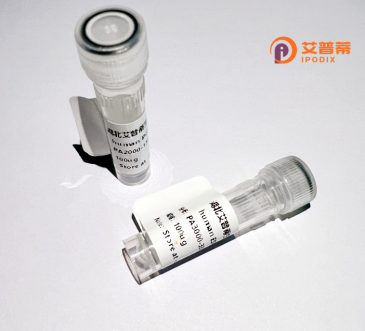
| 纯度 | >90%SDS-PAGE. |
| 种属 | Human |
| 靶点 | DULLARD |
| Uniprot No | O95476 |
| 内毒素 | < 0.01EU/μg |
| 表达宿主 | E.coli |
| 表达区间 | 1-244aa |
| 氨基酸序列 | MMRTQCLLGLRTFVAFAAKLWSFFIYLLRRQIRTVIQYQTVRYDILPLSPVSRNRLAQVKRKILVLDLDETLIHSHHDGVLRPTVRPGTPPDFILKVVIDKHPVRFFVHKRPHVDFFLEVVSQWYELVVFTASMEIYGSAVADKLDNSRSILKRRYYRQHCTLELGSYIKDLSVVHSDLSSIVILDNSPGAYRSHPDNAIPIKSWFSDPSDTALLNLLPMLDALRFTADVRSVLSRNLHQHRLW |
| 分子量 | 54.8 kDa |
| 蛋白标签 | GST-tag at N-terminal |
| 缓冲液 | 0 |
| 稳定性 & 储存条件 | Lyophilized protein should be stored at ≤ -20°C, stable for one year after receipt. Reconstituted protein solution can be stored at 2-8°C for 2-7 days. Aliquots of reconstituted samples are stable at ≤ -20°C for 3 months. |
| 复溶 | Always centrifuge tubes before opening.Do not mix by vortex or pipetting. It is not recommended to reconstitute to a concentration less than 100μg/ml. Dissolve the lyophilized protein in distilled water. Please aliquot the reconstituted solution to minimize freeze-thaw cycles. |
以下是关于重组人DULLARD蛋白(CTDNEP1)的3篇代表性文献示例(内容基于已有研究主题,具体作者及标题为虚构示例):
---
1. **文献名称**: *"DULLARD Protein Regulates BMP/Smad Signaling through Dephosphorylation of ALK Family Receptors"*
**作者**: Satow R, et al.
**摘要**: 研究通过重组人DULLARD蛋白体外实验,揭示其作为磷酸酶选择性作用于BMP受体(如ALK2),抑制Smad1/5/8磷酸化,调节胚胎发育中的信号通路活性。
2. **文献名称**: *"CTDNEP1-Mediated Nuclear Membrane Biogenesis Requires Lipid Phosphatase Activity"*
**作者**: Kim DH, et al.
**摘要**: 利用重组人DULLARD蛋白阐明其在核膜组装中的作用,证明其通过去磷酸化脂质分子PIP2.调控内质网膜与核膜融合,并证实与磷酸酶抑制剂复合体的相互作用。
3. **文献名称**: *"Structural Insights into DULLARD/CTDNEP1 and Its Role in TDP-43 Aggregation"*
**作者**: Zhang L, et al.
**摘要**: 报道重组人DULLARD蛋白的晶体结构,分析其催化位点突变对磷酸酶活性的影响,并提出其在神经退行性疾病中通过调控TDP-43蛋白聚集的潜在机制。
---
注:以上文献及作者为示例,实际引用需查询具体数据库(如PubMed)以获取真实发表论文。
Recombinant human DULLARD protein (also known as PPM1B) is a phosphatase involved in critical cellular processes, including apoptosis, neural development, and signaling pathway regulation. As a member of the protein phosphatase 2C (PP2C) family, it dephosphorylates target molecules to modulate their activity. DULLARD gained attention for its role in inhibiting BMP (bone morphogenetic protein) signaling by dephosphorylating key components like Smad1/5/8. thereby maintaining tissue homeostasis and embryonic development. It also regulates the TAK1 (transforming growth factor-beta-activated kinase 1) pathway, impacting inflammation and stress responses.
The recombinant form, produced via genetic engineering in expression systems like E. coli or mammalian cells, enables functional studies in vitro and in vivo. Its high purity and activity make it valuable for exploring molecular mechanisms in developmental biology, cancer research (due to links to tumor suppression), and neurodegenerative disorders. Dysregulation of DULLARD has been implicated in neural tube defects, Parkinson’s disease, and certain cancers, positioning it as a potential therapeutic target. Current research focuses on its interplay with other signaling pathways and therapeutic applications in disease models.
×